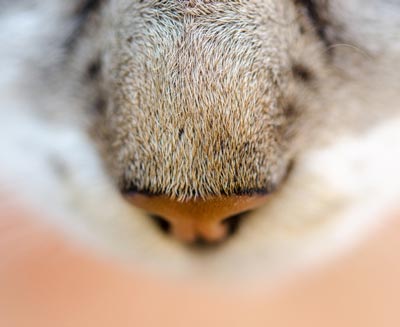Nasal Discharge in Cats

Cats with discharge from the nose might be suffering from one of a few different conditions. Your veterinarian will need to examine your cat thoroughly to determine the exact cause and necessary treatment. In the meantime, some general causes of runny nose in cats are discussed here.
Upper Respiratory Infection
Infection of the nasal passages and upper airways can cause nasal discharge in cats. Most of the time, these are viruses, but bacteria and fungi can also cause URIs.
Other signs of URI may include eye discharge, sneezing, fever, enlarged lymph nodes, decreased appetite, and lethargy. You can learn more here: "Upper Respiratory Tract Conditions in Cats."
Foreign Body or Polyp
A growth or foreign material in the nasal passages, sinuses, or roof of the mouth may cause nasal discharge in cats. These can include polyps, cancer, and foxtails.
Other signs of a foreign body or abnormal growth may include foul odor from the mouth or nose, decreased appetite, lethargy, and rubbing at the nose or face with the paws.
Dental Disease
Problems with the teeth can cause nasal discharge in certain instances. Abscesses in the upper molars and premolars commonly cause a runny nose in cats.
Other signs that might accompany a runny nose in cases of dental disease include swelling of the face, enlarged lymph nodes, difficulty eating, odor from the mouth, rubbing at the face, and lethargy.
Gastrointestinal Problems
A cat with problems swallowing or certain stomach problems like acid reflux may develop a runny nose as liquids from the digestive tract are forced into the nasal passages. These cats might also be vomiting, wheezing, not eating, and lethargic.
Congenital Formation of the Nasal Passages
Some cats are simply born with nasal passages formed in such a way that chronic drainage is present. This is more common with eye drainage, but it can also be the cause of a perpetually runny nose.
Diagnosis of Runny Nose in Cats
When you visit the veterinarian with your cat that is suffering from nasal discharge, the doctor will take a thorough history from you and do a physical examination. Results from looking at the eyes, ears, nose, and mouth, taking a temperature, feeling lymph nodes, and listening to the lungs will all be taken into consideration.
In some cases, a culture of the discharge may be sent to the lab to look for an infectious agent. In chronic cases, further tests such as CT scan, biopsy, or skull x-rays may be recommended.
You May Also Like These Articles:
Zoonoses: Things Cats Can Spread to Humans
Upper Respiratory Tract Conditions in Cats
Pet Insurance: Peace of Mind for Your Cat's Health
Decreasing Shelter Cat Euthanasia
How to Care for Orphaned Kittens
Cats Snoring: Normal or Abnormal?
If Your Cat Does This Strange Thing, Don't Ignore It
Sound-Related Seizures in Cats
Notice: Ask-a-Vet is an affiliated service for those who wish to speak with a veterinary professional about their pet's specific condition. Initially, a bot will ask questions to determine the general nature of your concern. Then, you will be transferred to a human. There is a charge for the service if you choose to connect to a veterinarian. Ask-a-Vet is not manned by the staff or owners of CatHealth.com, and the advice given should not delay or replace a visit to your veterinarian.




